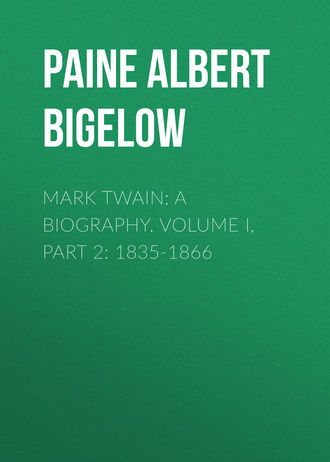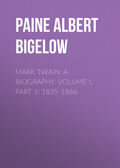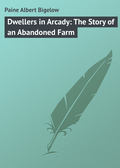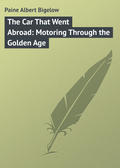
Paine Albert Bigelow
Mark Twain: A Biography. Volume I, Part 2: 1835-1866
LXX
INNOCENTS AT HOME—AND "THE INNOCENTS ABROAD"
He was in Jacksonville, Illinois, at the end of January (1869), and in a letter to Bliss states that he will be in Elmira two days later, and asks that proofs of the book be sent there. He arrived at the Langdon home, anxious to hear the reports that would make him, as the novels might say, "the happiest or the most miserable of men." Jervis Langdon had a rather solemn look when they were alone together. Clemens asked:
"You've heard from those gentlemen out there?"
"Yes, and from another gentleman I wrote concerning you."
"They don't appear to have been very enthusiastic, from your manner."
"Well, yes, some of them were."
"I suppose I may ask what particular form their emotion took?"
"Oh yes, yes; they agree unanimously that you are a brilliant, able man, a man with a future, and that you would make about the worst husband on record."
The applicant for favor had a forlorn look.
"There's nothing very evasive about that," he said:
There was a period of reflective silence. It was probably no more than a few seconds, but it seemed longer.
"Haven't you any other friend that you could suggest?" Langdon said.
"Apparently none whose testimony would be valuable."
Jervis Langdon held out his hand. "You have at least one," he said. "I believe in you. I know you better than they do."
And so came the crown of happiness. The engagement of Samuel Langhorne Clemens and Olivia Lewis Langdon was ratified next day, February 4, 1869.
But if the friends of Mark Twain viewed the idea of the marriage with scant favor, the friends of Miss Langdon regarded it with genuine alarm. Elmira was a conservative place—a place of pedigree and family tradition; that a stranger, a former printer, pilot, miner, wandering journalist and lecturer, was to carry off the daughter of one of the oldest and wealthiest families, was a thing not to be lightly permitted. The fact that he had achieved a national fame did not count against other considerations. The social protest amounted almost to insurrection, but it was not availing. The Langdon family had their doubts too, though of a different sort. Their doubts lay in the fear that one, reared as their daughter had been, might be unable to hold a place as the wife of this intellectual giant, whom they felt that the world was preparing to honor. That this delicate, sheltered girl could have the strength of mind and body for her position seemed hard to believe. Their faith overbore such questionings, and the future years proved how fully it was justified.
To his mother Samuel Clemens wrote:
She is only a little body, but she hasn't her peer in Christendom. I gave her only a plain gold engagement ring, when fashion imperatively demands a two-hundred-dollar diamond one, and told her it was typical of her future life-namely, that she would have to flourish on substance, rather than luxuries (but you see I know the girl—she don't care anything about luxuries)…. She spends no money but her astral year's allowance, and spends nearly every cent of that on other people. She will be a good, sensible little wife, without any airs about her. I don't make intercession for her beforehand, and ask you to love her, for there isn't any use in that—you couldn't help it if you were to try. I warn you that whoever comes within the fatal influence of her beautiful nature is her willing slave forevermore.
To Mrs. Crane, absent in March, her father wrote:
DEAR SUE,—I received your letter yesterday with a great deal of pleasure, but the letter has gone in pursuit of one S. L. Clemens, who has been giving us a great deal of trouble lately. We cannot have a joy in our family without a feeling, on the part of the little incorrigible in our family, that this wanderer must share it, so, as soon as read, into her pocket and off upstairs goes your letter, and in the next two minutes into the mail, so it is impossible for me now to refer to it, or by reading it over gain an inspiration in writing you. . .
Clemens closed his lecture tour in March, acid went immediately to Elmira. He had lectured between fifty and sixty times, with a return of something more than $8,000, not a bad aggregate for a first season on the circuit. He had planned to make a spring tour to California, but the attraction at Elmira was of a sort that discouraged distant travel. Furthermore, he disliked the platform, then and always. It was always a temptation to him because of its quick and abundant return, but it was none the less distasteful. In a letter of that spring he wrote:
I most cordially hate the lecture field. And after all, I shudder to think I may never get out of it. In all conversation with Gough, and Anna Dickinson, Nasby, Oliver Wendell Holmes, Wendell Phillips, and the other old stagers, I could not observe that they ever expected or hoped to get out of the business. I don't want to get wedded to it as they are.
He declined further engagements on the excuse that he must attend to getting out his book. The revised proofs were coming now, and he and gentle Livy Langdon read them together. He realized presently that with her sensitive nature she had also a keen literary perception. What he lacked in delicacy—and his lack was likely to be large enough in that direction—she detected, and together they pruned it away. She became his editor during those happy courtship days—a position which she held to her death. The world owed a large debt of gratitude to Mark Twain's wife, who from the very beginning—and always, so far as in her strength she was able—inspired him to give only his worthiest to the world, whether in written or spoken word, in counsel or in deed. Those early days of their close companionship, spiritual and mental, were full of revelation to Samuel Clemens, a revelation that continued from day to day, and from year to year, even to the very end.
The letter to Bliss and the proofs were full of suggested changes that would refine and beautify the text. In one of them he settles the question of title, which he says is to be:
THE INNOCENTS ABROAD
or
THE NEW PILGRIM'S PROGRESS
and we may be sure that it was Olivia Langdon's voice that gave the deciding vote for the newly adopted chief title, which would take any suggestion of irreverence out of the remaining words.
The book was to have been issued in the spring, but during his wanderings proofs had been delayed, and there was now considerable anxiety about it, as the agencies had become impatient for the canvass. At the end of April Clemens wrote: "Your printers are doing well. I will hurry the proofs"; but it was not until the early part of June that the last chapters were revised and returned. Then the big book, at last completed, went to press on an edition of twenty thousand, a large number for any new book, even to-day.
In later years, through some confusion of circumstance, Mark Twain was led to believe that the publication of The Innocents Abroad was long and unnecessarily delayed. But this was manifestly a mistake. The book went to press in June. It was a big book and a large edition. The first copy was delivered July 20 (1869), and four hundred and seventeen bound volumes were shipped that month. Even with the quicker mechanical processes of to-day a month or more is allowed for a large book between the final return of proofs and the date of publication. So it is only another instance of his remembering, as he once quaintly put it, "the thing that didn't happen."—[In an article in the North American Review (September 21, 1906) Mr. Clemens stated that he found it necessary to telegraph notice that he would bring suit if the book was not immediately issued. In none of the letters covering this period is there any suggestion of delay on the part of the publishers, and the date of the final return of proofs, together with the date of publication, preclude the possibility of such a circumstance. At some period of his life he doubtless sent, or contemplated sending, such a message, and this fact, through some curious psychology, became confused in his mind with the first edition of The Innocents Abroad.]
LXXI
THE GREAT BOOK OF TRAVEL
'The Innocents Abroad' was a success from the start. The machinery for its sale and delivery was in full swing by August 1, and five thousand one hundred and seventy copies were disposed of that month—a number that had increased to more than thirty-one thousand by the first of the year. It was a book of travel; its lowest price was three and a half dollars. No such record had been made by a book of that description; none has equaled it since.—[One must recall that this was the record only up to 1910. D.W.]
If Mark Twain was not already famous, he was unquestionably famous now. As the author of The New Pilgrim's Progress he was swept into the domain of letters as one riding at the head of a cavalcade—doors and windows wide with welcome and jubilant with applause. Newspapers chorused their enthusiasm; the public voiced universal approval; only a few of the more cultured critics seemed hesitant and doubtful.
They applauded—most of them—but with reservation. Doctor Holland regarded Mark Twain as a mere fun maker of ephemeral popularity, and was not altogether pleasant in his dictum. Doctor Holmes, in a letter to the author, speaks of the "frequently quaint and amusing conceits," but does not find it in his heart to refer to the book as literature. It was naturally difficult for the East to concede a serious value to one who approached his subject with such militant aboriginality, and occasionally wrote "those kind." William Dean Howells reviewed the book in the Atlantic, which was of itself a distinction, whether the review was favorable or otherwise. It was favorable on the whole, favorable to the humor of the book, its "delicious impudence," the charm of its good-natured irony. The review closed:
It is no business of ours to fix his rank among the humorists California has given us, but we think he is, in an entirely different way from all the others, quite worthy of the company of the best.
This is praise, but not of an intemperate sort, nor very inclusive. The descriptive, the poetic, the more pretentious phases of the book did not receive attention. Mr. Howells was perhaps the first critic of eminence to recognize in Mark Twain not only the humorist, but the supreme genius-the "Lincoln of our literature." This was later. The public—the silent public—with what Howells calls "the inspired knowledge of the simple-hearted multitude," reached a similar verdict forthwith. And on sufficient evidence: let the average unprejudiced person of to-day take up the old volume and read a few chapters anywhere and decide whether it is the work of a mere humorist, or also of a philosopher, a poet, and a seer. The writer well remembers a little group of "the simple-hearted multitude" who during the winter of '69 and '70 gathered each evening to hear the Innocents read aloud, and their unanimous verdict that it was the "best book of modern times."
It was the most daring book of its day. Passages of it were calculated to take the breath of the orthodox reader; only, somehow, it made him smile, too. It was all so good-natured, so openly sincere. Without doubt it preached heresy—the heresy of viewing revered landmarks and relics joyously, rather than lugubriously; reverentially, when they inspired reverence; satirically, when they invited ridicule, and with kindliness always.
The Innocents Abroad is Mark Twain's greatest book of travel. The critical and the pure in speech may object to this verdict. Brander Matthews regards it second to A Tramp Abroad, the natural viewpoint of the literary technician. The 'Tramp' contains better usage without doubt, but it lacks the "color" which gives the Innocents its perennial charm. In the Innocents there is a glow, a fragrance, a romance of touch, a subtle something which is idyllic, something which is not quite of reality, in the tale of that little company that so long ago sailed away to the harbors of their illusions beyond the sea, and, wandered together through old palaces and galleries, and among the tombs of the saints, and down through ancient lands. There is an atmosphere about it all, a dream-like quality that lies somewhere in the telling, maybe, or in the tale; at all events it is there, and the world has felt it ever since. Perhaps it could be defined in a single word, perhaps that word would be "youth." That the artist, poor True Williams, felt its inspiration is certain. We may believe that Williams was not a great draftsman, but no artist ever caught more perfectly the light and spirit of the author's text. Crude some of the pictures are, no doubt, but they convey the very essence of the story; they belong to it, they are a part of it, and they ought never to perish. 'A Tramp Abroad' is a rare book, but it cannot rank with its great predecessor in human charm. The public, which in the long run makes mistakes, has rendered that verdict. The Innocents by far outsells the Tramp, and, for that matter, any other book of travel.
THE PURCHASE OF A PAPER
It is curious to reflect that Mark Twain still did not regard himself as a literary man. He had no literary plans for the future; he scarcely looked forward to the publication of another book. He considered himself a journalist; his ambition lay in the direction of retirement in some prosperous newspaper enterprise, with the comforts and companionship of a home. During his travels he had already been casting about for a congenial and substantial association in newspaperdom, and had at one time considered the purchase of an interest in the Cleveland Herald. But Buffalo was nearer Elmira, and when an opportunity offered, by which he could acquire a third interest in the Buffalo Express for $25,000, the purchase was decided upon. His lack of funds prompted a new plan for a lecture tour to the Pacific coast, this time with D. R. Locke (Nasby), then immensely popular, in his lecture "Cussed Be Canaan."
Clemens had met Nasby on the circuit, and was very fond of him. The two had visited Boston together, and while there had called on Doctor Holmes; this by the way. Nasby was fond of Clemens too, but doubtful about the trip-doubtful about his lecture:
Your proposition takes my breath away. If I had my new lecture completed I wouldn't hesitate a moment, but really isn't "Cussed Be Canaan" too old? You know that lemon, our African brother, juicy as he was in his day, has been squeezed dry. Why howl about his wrongs after said wrongs have been redressed? Why screech about the "damnable spirit of Cahst" when the victim thereof sits at the first table, and his oppressor mildly takes, in hash, what he leaves? You see, friend Twain, the Fifteenth Amendment busted "Cussed Be Canaan." I howled feelingly on the subject while it was a living issue, for I felt all that I said and a great deal more; but now that we have won our fight why dance frantically on the dead corpse of our enemy? The Reliable Contraband is contraband no more, but a citizen of the United States, and I speak of him no more.
Give me a week to think of your proposition. If I can jerk a lecture in time I will go with you. The Lord knows I would like to. —[Nasby's lecture, "Cussed Be Canaan," opened, "We are all descended from grandfathers!" He had a powerful voice, and always just on the stroke of eight he rose and vigorously delivered this sentence. Once, after lecturing an entire season—two hundred and twenty-five nights—he went home to rest. That evening he sat, musingly drowsing by the fire, when the clock struck eight. Without a moment's thought Nasby sprang to his feet and thundered out, "We are all descended from grandfathers!"]
Nasby did not go, and Clemens's enthusiasm cooled at the prospect of setting out alone on that long tour. Furthermore, Jervis Langdon promptly insisted on advancing the money required to complete the purchase of the Express, and the trade was closed.—[Mr. Langdon is just as good for $25,000 for me, and has already advanced half of it in cash. I wrote and asked whether I had better send him my note, or a due bill, or how he would prefer to have the indebtedness made of record, and he answered every other topic in the letter pleasantly, but never replied to that at all. Still, I shall give my note into a hands of his business agent here, and pay him the interest as it falls due.—S. L. C. to his mother.]
The Buffalo Express was at this time in the hands of three men—Col. George F. Selkirk, J. L. Lamed, and Thomas A. Kennett. Colonel Selkirk was business manager, Lamed was political editor. With the purchase of Kennett's share Clemens became a sort of general and contributing editor, with a more or less "roving commission"—his hours and duties not very clearly defined. It was believed by his associates, and by Clemens himself, that his known connection with the paper would give it prestige and circulation, as Nasby's connection had popularized the Toledo Blade. The new editor entered upon his duties August 14 (1869). The members of the Buffalo press gave him a dinner that evening, and after the manner of newspaper men the world over, were handsomely cordial to the "new enemy in their midst."
There is an anecdote which relates that next morning, when Mark Twain arrived in the Express office (it was then at 14 Swan Street), there happened to be no one present who knew him. A young man rose very bruskly and asked if there was any one he would like to see. It is reported that he replied, with gentle deliberation:
"Well, yes, I should like to see some young man offer the new editor a chair."
It is so like Mark Twain that we are inclined to accept it, though it seems of doubtful circumstance. In any case it deserves to be true. His "Salutatory" (August 18th) is sufficiently genuine:
Being a stranger, it would be immodest for me to suddenly and violently assume the associate editorship of the Buffalo Express without a single word of comfort or encouragement to the unoffending patrons of the paper, who are about to be exposed to constant attacks of my wisdom and learning. But the word shall be as brief as possible. I only want to assure parties having a friendly interest in the prosperity of the journal that I am not going to hurt the paper deliberately and intentionally at any time. I am not going to introduce any startling reforms, nor in any way attempt to make trouble…. I shall not make use of slang and vulgarity upon any occasion or under any circumstances, and shall never use profanity except when discussing house rent and taxes. Indeed, upon a second thought, I shall not use it even then, for it is unchristian, inelegant, and degrading; though, to speak truly, I do not see how house rent and taxes are going to be discussed worth a cent without it. I shall not often meddle with politics, because we have a political Editor who is already excellent and only needs to serve a term or two in the penitentiary to be perfect. I shall not write any poetry unless I conceive a spite against the subscribers.
Such is my platform. I do not see any use in it, but custom is law and must be obeyed.
John Harrison Mills, who was connected with the Express in those days, has written:
I cannot remember that there was any delay in getting down to his work. I think within five minutes the new editor had assumed the easy look of one entirely at home, pencil in hand and a clutch of paper before him, with an air of preoccupation, as of one intent on a task delayed. It was impossible to be conscious of the man sitting there, and not feel his identity with all that he had enjoyed, and the reminiscence of it he that seemed to radiate; for the personality was so absolutely in accord with all the record of himself and his work. I cannot say he seemed to be that vague thing they call a type in race or blood, though the word, if used in his case for temperament, would decidedly mean what they used to call the "sanguine."
I thought that, pictorially, the noble costume of the Albanian would have well become him. Or he might have been a Goth, and worn the horned bull-pate helmet of Alaric's warriors; or stood at the prow of one of the swift craft of the Vikings. His eyes, which have been variously described, were, it seemed to me, of an indescribable depth of the bluish moss-agate, with a capacity of pupil dilation that in certain lights had the effect of a deep black….
Mr. Mills adds that in dress he was now "well groomed," and that consequently they were obliged to revise their notions as to the careless negligee which gossip had reported.—[From unpublished Reminiscences kindly lent to the author by Mr. Mills]







